#Parentalia
Explore tagged Tumblr posts
Note
9 and 15 for the ask game :3
Thanks a lot for asking and tour interest! Here you are my main babies!
9. what book genre is their least favorite?


15.who is your OC’s best friend?

#hetalia#latín hetalia#ocs#itanu and taira#itanu da silva artigas#taira da silva artigas#parentalia#parent nations au#lh#lh uruguay#lh brazil#aph#axis powers hetalia#hws#ask game#i have them since 2011
13 notes
·
View notes
Text
Moșii de vară sau despre creștinarea unei vechi sărbători păgâne
Sursă: Moșii de vară sau despre creștinarea unei vechi sărbători păgâne – Cartea Sfinţilor – Cronopedia
View On WordPress
0 notes
Text

On this last day of Parentalia/Feralia I'm making offerings in thanks to the divine Manes of my ancestors for their sojourn with us over the past 9 days. May they protect and watch over my family & me throughout the coming year. 'Honour the tombs to placate the paternal souls and convey small gifts.. The Manes seek small things, Pietas rather than a costly gift is pleasing. A tile wreathed with garlands, scattered grain, a small morsel of salt, bread softened in wine, and loose violets are enough. Add prayers & their own words to the altars that have been set up' Ovid, Fasti.
'Est honor et tumulis, animas placare paternas, parvaque in exstructas munera ferre.. Parva petunt manes: pietas pro divite grata est munere tegula porrectis satis est velata coronis et sparsae fruges parcaque mica salis, inque mero mollita Ceres violaeque solutae. Adde preces positis et sua verba focis'.
Neste último día de Parentalia/Feralia darei ofrendas en agradecemento aos espíritos divinos dos meus antepasados pola súa presenza connosco nos últimos 9 días. Que protexan e bendigan á miña familia e a min durante o ano que vén.
'Honra os túmulos para aplacar as animas paternas e lévalles pequenos agasallos.. Os Manes só queren cousas pequenas, Pietas máis que un agasallo custoso. Abonda cunha tella con grilandas, grans espallados, un anaquiño de sal, pan amolecido en viño e violetas soltas. Engade oracións e as súas palabras aos altares." Ovidio, Fasti.
0 notes
Text

Happy Parentalia!
0 notes
Text
Feb 1 | Introduction
Ovid introduces his own claim to fame (elegiac verse), and follows this up with flattery for Augustus.
He then goes on to give the etymology for februa and examples of purifying objects and rites, as well as Greek mythological examples of purification, including Peleus and Medea.
He closes out the passage with a bit of "history," claiming that while January has always been the first month of the year, February was once the last month of the year before it was eventually moved to its current position.
#ovid#ovid daily#fasti#fastorum libri sex#tagamemnon#we're on to month two!#lots of fun stuff is in store for us in February#including the Parentalia (Roman ghosts!)#and the Lupercalia!
12 notes
·
View notes
Text
Every Pagan Holiday

JANUARY
KALENDS
1st January
Origins: Ancient Greece/Rome
Observed by: Hellenic/Roman polytheists
Honouring Janus/Juno, first day of the Year. Kalends brought us the word 'calendar'.
ÞORRABLÓT (THORRABLÓT)
End of January/beginning of February
Origins: Iceland
Observed by: Heathens, Asatru
Midwinter Festival honouring Thor, usually by feasting and poetry.

FEBRUARY
IMBOLC
2nd February
Origins: Celtic polytheism /Ireland, as St. Brigid's Day
Observed by: Most neopagans, Wiccans, Druids, Asatru (as Charming of the Plow)
Imbolc is the most widely known and observed pagan holiday in the months of January and February. It falls at the beginning of spring/end of the winter for the Celtic peoples; marking the changing of the seasons, as most holidays do. St. Brigid is a Christianised form of or inspired by the Celtic fertility goddess Brigid who is celebrated on this day.
PARENTALIA
13th-21st February
Origins: Ancient Rome
Observed by: Greco-Roman polytheists
Translating to 'Ancestors Day', Parentalia is a nine-day celebration of deceased ancestors. Historically it was observed by feasting and making offerings and sacrifices to the dead and spirits of the underworld.
VÁLI'S BLOT
14th February
Origins: Old Norse
Observed by: Heathens, Asatru, Norse polytheists
Váli's Blot is considered by some Asatru to be the Norse equivalent of Valentine's Day but is widely acknowledged as a season changing festival. A day for marriage and celebrating with family and friends, and for remembrance of Váli, the son of Odin who defeated Höðr on this day.
LUPERCALIA
15th February
Origins: Ancient Rome
Observed by: Greco-Roman polytheists
Festival thought to honour a wolf who raised abandoned princes, celebrated originally by sacrificing goats to the gods, feasting, and, for fertility, nudity and fornication.
LESSER ELEUSINIAN MYSTERIES
17th-23rd February
Origins: Ancient Greece
Observed by: Hellenic polytheists
Initiation to the cult of Persephone and Demeter by sacrificing a pig. Prelude to Greater Mysteries, initiations held on these dates. Once completed, initiates could then move onto Greater Mysteries in the autumn.
ANTHESTERIA
27th February - 1st March 2021
Origins: Ancient Greece
Observed by: Hellenic polytheists
Athenian festivals dedicated to Dionysus and the dead. Held around the full moon in the month of Anthesterion, which in the Gregorian calendar this year roughly translates to 27th February.
THE DISTING/DÍSABLÓT
End of February/beginning of March
Origins: Uppsala, Sweden
Observed by: Heathens, Asatru, Norse polytheists
Celebration of Valkyries and other female spirits, called dísir. Sacrifices were made for a good harvest. Celebrated still by an annual market in Sweden.

MARCH
KALENDS
1st March
Origins: Ancient Greece/Rome
Observed by: Hellenic/Roman polytheists
Honouring the god Mars/Ares. Kalends brought us the word 'calendar'.
OSTARA/EARRACH
20th March
Origins: Anglo Saxon paganism, popularised as Ostara by Wicca
Observed by: Anglo Saxon Pagans, Wiccans, Neopagans, Druids (as Alba Eilir), Heathens (as Summer Finding), Ásatrú (as Sigrblót)
The northern hemisphere's vernal equinox, the word Ostara was introduced though Wicca and named for the goddess Eostre. Surprisingly unrelated to Easter in all but name, Ostara symbolises the beginning of spring. As a seasonal holiday it is widely celebrated by many different groups of pagans.
RAGNAR LODBROK'S DAY
28th March
Origins: Icelandic Sagas
Observed by: Ásatrú
Day of remembrance for Ragnar Lodbrok, Viking King of legend

APRIL
KALENDS/VENERALIA
1st April
Origins: Ancient Greece/Rome
Observed by: Hellenic/Roman polytheists
Celebration of the first of the month, this one honouring the goddess, Venus.
REMEMBRANCE FOR HAAKON SIGURDSSON
9th April
Origins: Norway, C9th
Observed by: Ásatrú
Day of remembrance for ruler of Norway who claimed lineage to Odin in the Icelandic Sagas.
WALPURGISNACHT
30th April
Origins: German Christianity, originally Saint Walpurga was known for banishing witches and other pests
Observed by: LaVeyan Satanists
Anton LaVey chose to celebrate this holiday as a follow up to the spring equinox and due to its past association with witchcraft.
HEXENNACHT (WITCHES' NIGHT)
30th April
Origins: German folklore, as Walpurgisnacht but witches were alleged to convene with the devil in this night
Observed by: Temple of Satan as 'a solemn holiday to honour those who were victimized by superstition'.

MAY
BEALTAINE/BELTANE
1st May
Origins: Celtic (Ireland/Scotland/Isle of Man)
Observed by: Wiccans, Neopagans, Celtic reconstructionist, Ásatrú/Heathens (as May Day)
One of the more well-known pagan festivals, Beltane is a festival of fire and the beginning of the summer. Also widely referred to as May Day, it is celebrated by lighting fires.
KALENDS
1st May
Origins: Ancient Greece/Rome
Observed by: Hellenic/Roman polytheists
Honouring the goddess Maia, for whom the month may have been named.
REMEMBRANCE FOR Guðröðr of Guðbrandsdál
9th May
Origins: C11 Norway, Icelandic Sagas
Observed by: Ásatrú, Norse, heathens
Guðröðr had his tongue removed by ��láfr for rebelling against violent conversion from Norse paganism to Christianity.

JUNE
KALENDS
1st June
Origins: Ancient Greece/Rome
Observed by: Hellenic/Roman polytheists
Anniversary of temples to Juno Moneta (protectress of money, her temple was where coins were made), Mars/Ares (God of war), and the Tempestates (goddesses of storms).
ARRHEPHORIA
3rd Skirophorion (translates to mid-June)
Origins: Ancient Greece
Observed by: Hellenic reconstructionist
Feast in celebration of Athena and fertility.
MIDSUMMER/SUMMER SOLSTICE
21st June
Origins: Agricultural holiday/longest day observed for centuries by many civilisations. Christianity can date to as early as C4th
Observed by: Wiccans/Germanic neopagans (as Litha), Asatru/Heathens, Druids (as Alban Hefin)
One of the main four holidays in the Wheel of the Year and popularised by Wiccans and neopagans as Litha which is taken from the Anglo-Saxon words for June/July, this is the longest day of the year and the middle point and sometimes considered the beginning of summer.

JULY
REMEMBRANCE FOR UNNR/AUD THE DEEP MINDED
9th July
Origins: C9th Iceland
Observed by: Ásatrú, Heathens, Norse reconstructionist
Aud was a traveller in the 9th century moving between Dublin, the Hebrides, Orkney, and finally Iceland following the deaths of her husband and son. This day is to honour her memory.
HERACLEIA
July/August
Origins: Ancient Greece
Observed by: Hellenic polytheists
Festival dedicated to Heracles the demigod and his death, involving feasting and celebration.

AUGUST
LUGHNASADH/LAMMAS
1st August
Origins: Celtic Britain (Ireland, Scotland, Isle of Man)
Observed by: Wiccans, Neopagans, Christians (as Lammas), Ásatrú (as Freyfaxi)
Named for the god Lugh, this festival is one of the Celtic harvest festivals and marks the beginning of the harvesting months. It was celebrated by climbing mountains, bull sacrifice, offerings, and feasting. Handfasting is commonplace with Wiccans in modern times.
REMEMBRANCE FOR REDBAD, KING OF THE FRISIANS
9th August
Origins: C7th Frisia (area of Germany/Netherlands)

SEPTEMBER
NOUMENIA
8th September
Origins: Ancient Greece
Observed by: Hellenic polytheists
Celebration of new Hellenic lunar month. Offerings of honey and incense made to household deities.
REMEMBRANCE FOR HERMANN THE CHERUSCAN
9th September
Origins: C9th CE
Observed by: Heathens, Ásatrú
Hermann the Cheruscan, also known as Arminius of the Cherusci tribe, led the defeat against the Romans at the Battle of Teutoburg Forest and is lauded for saving Eastern Germanic peoples from being conquered by the Roman Empire.
AUTUMN EQUINOX (NORTHERN HEMISPHERE)
22nd September
Origins: 1970s neopaganism
Observed by: Wiccans and Neopagans (as Mabon), Ásatrú (as Winter Finding)
Named Mabon by prominent Wicca and Neopagan Aidan Kelly, after the Welsh mythological figure Mabon ap Moldron, the autumn equinox is one of the harvest festivals and marks the beginning of autumn in the northern hemisphere. Mabon is a relatively new pagan holiday not based on any specific historical festival, but traditionally people around the world would celebrate some kind of harvest festival around the end of September/beginning of October.

OCTOBER
PYANOPSIA
7th October
Origins: Ancient Greece
Observed by: Hellenic polytheists
Pyanopsia, or Pyanepsia, is a festival to honour Apollo, one of the most important deities, God of music, the sun, knowledge, healing, and archery - amongst other things. During the festival, two special offerings would be placed on doorways and carried to the temple. These offerings were a bean stew, and an olive branch wrapped in wool with honeys, pastries and seasonal fruits hanging from it.
REMEMBRANCE FOR LEIF EIRIKSSON
9th October
Origins: C10th CE
Observed by: Heathens, Ásatrú, Norse pagans
Remembrance for Leif and his sister Freydís Eiríksdóttir, children of Erik the Red, who are cited with being the first Norse explorers in North America.
THESMOPHORIA
12th-14th October
Origins: Ancient Greece
Observed by: Hellenic polytheists
Festival held in honour of Demeter Thesmophoros, goddess of agriculture, and her daughter Persephone, goddess of death and life, Queen of the Underworld. Celebrated primarily by women, this festival is linked with fertility, and we know very little about it due to its secretive rites. It is thought that it involved the sacrifice of pigs (although some sources say women), and abstinence.
REMEMBRANCE FOR ERIK THE RED
28th October
Origins: C9th CE
Observed by: Heathens, Ásatrú, Norse pagans
Erik the Red, probably named for the colour of his hair and beard, was the first permanent European settler in Greenland. His children were explorers too, who went to America, and although his wife converted to Christianity, Erik remained faithful to his Norse pagan gods.
SAMHAIN (HALLOWE'EN)
31st October-1st November
Origins: Gaelic - Scotland, Ireland, Isle of Man
Observed by: Celtic pagans, Neopagans, Wiccans
Pronounced SOW-in (sow rhyming with cow), Samhain was originally a harvest festival marking the beginning of winter. The day itself is the 1st November, but celebrations begin on October 31st, and this has become the accepted associated day. It's a festival of the dead, where the síthe, fae and spirits, can enter this realm from their own. Wiccans talk of a 'veil' thinning, meaning the boundary between worlds. Similar death related festivals around this time can be noted in other faiths from across the globe, and of course in the modern Hallowe'en.
WINTER NIGHTS (VETRNAETR), ÁLFABLÓT/DÍSABLÓT
31st October
Origins:
Celebrated by: Heathens, Ásatrú, Norse pagans
Winter Nights is mentioned in the Ynglinga Saga as one of the three greatest blessings of the year, the other two being Sigrblót in April, and þorrablót in late Jan/early Feb. Winter Nights is the celebration of the beginning of the winter season; Álfablót is a sacrifice to the elves, and Dísablót a sacrifice to the female spirits (dísir) and Valkyries.

NOVEMBER
REMEMBRANCE FOR SIGRID THE HAUGHTY
9th November
Origins: C9th CE
Observed by: Heathens, Ásatrú, Norse pagans
It is not actually known whether Sigrid Storråda, or Sigrid the Haughty, was an actual historical figure, an amalgamation of a few, or simply a myth. The lore goes that she was proposed to multiple times and turned down many but went on to orchestrate conflict when a potential suitor - Olaf Tryggvason, King of Norway - attempted to convert her to Christianity.

DECEMBER
REMEMBRANCE FOR EGILL SKALLAGRÍMSSON
9th December
Origins: C10th CE
Observed by: Heathens, Ásatrú, Norse pagans
Day celebrating the poet, farmer, and berserker Egill Skallagrímsson, who is recalled in The Icelandic Sagas by Snorri Sturluson. Egill is known for his many killings and escaping death by writing an epic poem after being captured when washing up on our Northumberland coastline.
SATURNALIA
17th - 23rd December
Origins: Ancient Rome
Observed by: Roman polytheists, some Hellenic
Like Yule and Lesser Dionysia, Saturnalia was the Roman winter festival celebrating the coming return of the sun and honouring the god Saturn. The standard feasting and drinking feature, and slaves would be treated as equals like Dionysia. Saturnalia is another festival cited as being picked up by Christians and used as inspiration for Christmas.
WINTER SOLSTICE (YULE/MIDWINTER)
21st December
Origins: Germanic nations, as early as C4th CE
Observed by: Norse pagans, Wiccans, Neopagans, LaVeyan Satanists, Ásatrú, Heathens, many Germanic nonpagan peoples
Yule is the midwinter festival known commonly among pagans as a time for feasting, being with loved ones, remembering ancestors, and looking forward to the return of the light and warmer days. Many pagans will celebrate Yule for more than one day, some celebrating a week either side, some for longer, up to two months, and some for twelve days afterwards. True Yule would have originally been in January for midwinter, but King Haakon the Good
moved it to coincide with the Christian celebrations in the 10th century, as told in the Ynglinga Saga.
On the 24th of December, Anglo Saxons are said to have celebrated 'Mothers Night' honouring female ancestors.
RURAL/LESSER DIONYSIA
End of December/beginning of January
Origins: Ancient Greece
Observed by: Hellenic polytheists
Smaller festival honouring the god Dionysus (Greater Dionysia took place in cities at the end of winter). Feasting, mask wearing to stop distinction between classes so that everyone could feel equal, sacrifices, parades, and phallic display were all used to celebrate.
#wheel of the year#wiccan#pagan#heathen#greek#mythology#holidays#religious holidays#pagan holidays#non-Abrahamic holidays#witch#witchcraft#witchblr#pagan wicca#polytheism#paganism#witches#witch holidays#witches holidays#pagan witch
277 notes
·
View notes
Text
Cracking open my Religio Romana handbook to check out what's going on next month and, since my Saturnalia post is making the rounds again, decided to write down some for anyone that would like to write some Jason/Reyna/Camp Jupiter religious shenanigans throughout the year 👍
This isn't all of them btw! I just grabbed a couple that seemed most interesting for their respective months or most relevant to the Roman babes
January 11th and January 15th: Carmentalia, two feast days in honour of Carmenta (goddess Juturna also celebrated on the 11th)
February 13th to 22nd: Parentalia, commemoration of ancestors and the dead in families
February 22nd: Caristia, family pot luck in spirit of love and forgiveneness
February 23rd: Terminalia, in honor of Terminus
February 27th: Equirria, first of two horse-racing festivals in honor of Mars
March 1st: original New Year's Day when sacred fire of Rome was renewed; Matronalia in honor of Juno Lucina; also considered the dies natalis (birthday) of Mars
March 14th: second Equirria
March 15th: Feriae Iovi, sacred to Jove (Jupiter)
March 17th: Agonalia in honour of Mars
April 1st: Veneralia in honor of Venus
April 21st: Parilia, rustic festival in honor of Pales, Roman patron goddess of shepherds and flocks, and the dies natalis (birthday) of Rome
April 23rd: Vinalia Priora, the first of two wine festivals
May 9th, 11th, and 13th: Lemuria, festival of the dead
May 15th: Mercuralia, in honor Mercury; Feriae (free day) of Jove (Jupiter)
June 3rd: anniversary of the Temple of Bellona
June 7th to 15th: Vestavia, in honour of Vesta, June 9th specifically is a die religiousus to her
June 24th: festival of Fors Fortuna
July 6th to 13th: Ludi Apollinares, games in honor of Apollo
July 14th to 19th: series of markets or fairs - not religious
July 17th: anniversary of the Temple of Honos and Virtus, sacrifice to Victory
July 23rd: Neptunalia, held in honor of Neptune
August 23rd: Vulcanalia in honor of Vulcan
September 1st: ceremonies for Jupiter Tonans (the Thunderer) and Juno Regina
September 20th to 23rd: days set aside for markets and fairs
October 7th: rites for Jupiter Fulgur (Jupiter of daytime lightning) and Juno Curitis
November 4th to 17th: Plebeian Games
November 18th to 20th: markets and fairs
December 1st: ceremonies at temples for Neptune and for Pietas
December 3rd: Bona Dea rites for women only
December 17th to 23rd: Saturnalia in honor of Saturn with public ritual on the 17th
Side note that I am not an academic, not religious, not a pagan, and not spiritual in any way. I just like reading about mythologies and how those stories/deities used to be, and still are, worshipped by people. Also helps when coming up with religions and stuff for stories. But that's it, I have one book and access to google/wikipedia and that's the depths on my knowledge on Roman polytheistic practices 🙌
#happy talks pjo#reyna avila ramirez arellano#jason grace#happy talks greek mythos#okay not technically but you guys get it#religio romana#feel to correct if i got smth wrong and this is your area of expertise#fun fact the festival on my birthday includes a dog sacrifice 😔
27 notes
·
View notes
Text
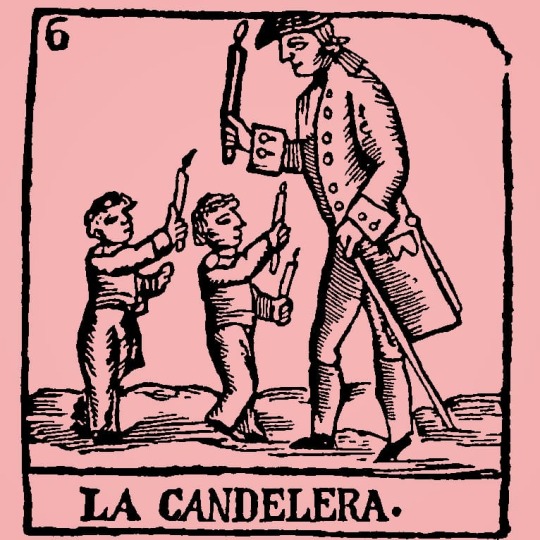
The 2nd of February is the Christian festivity called Candlemas (Candelera in Catalan). It's the date that ends the Christmas cycle, where traditionally people would put away the Nativity scene, though nowadays lots of people take it down soon after Three Wise Men Day (6th of January).
What does this day celebrate?
Candlemas is most likely a remnant of the Ancient Roman festival of Parentalia (last day of the Feralia), celebrated annually in February to remember the dead. During Parentalia, they did processions where they dressed in black and carried little blessed candles to the cemeteries to guide the dead people's souls.
Some say that the origins of Candlemas might also be related to another Ancient Roman festival celebrated in February: the Lupercalia, in honour of the god of fertility and shepherds Lupercus.
In the Christian tradition, this festivity celebrates when Mary brought Jesus to the temple. Biblical scholars explain that it was a tradition for Jewish women to bring their child to the temple 40 days after giving birth. Then, the child was presented to the priests and they were blessed in front of candles, and the woman was purified. Since the Christian tradition says Jesus was born on the 25th of December, 40 days after his birth is the 2nd of February. Candlemas is celebrated every year on this day to commemorate Mary introducing Jesus to the temple. The festivity was introduced officially by Pope Gelasius I in the year 496.
How is Candlemas celebrated?
Believers take candles to be blessed, and some places hold processions with lit candles. The candles are taken home to be kept, because they're believed to have protection powers.
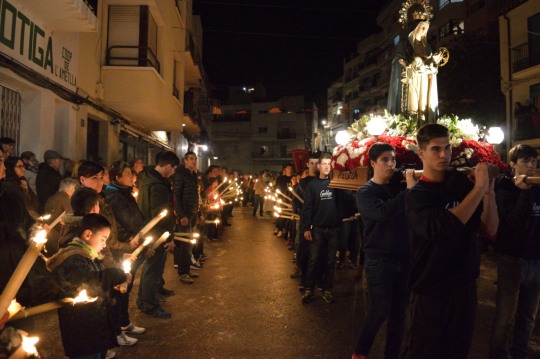
Candlemas procession in L'Ametlla de Mar (Terres de l'Ebre, Catalonia), who celebrates their festa major on this day. Photo: IPCITE.
Unlike other festivals of the Christian calendar (like local patron saint days, Christmas, Three Wise Men Day, Saint Anthony/Three Laps, Saint George, Midsummer/Saint John, Corpus, etc) which are celebrated by everyone in our country, Christian and non-Christian alike; Candlemas is not so widely celebrated by people who aren't Christian believers. But even then, there is one thing that everyone knows Candlemas for: predicting the weather.
In Catalan we have the saying: "Si la Candelera plora, l'hivern és fora. Si la Candelera riu, el fred és viu." which means "If Candlemas cries, the winter is out. If Candlemas laughs, the cold is alive". This sums it up, if it rains on February 2nd it's believed to be a sign that winter is ending. If it's sunny, winter will still go on.
Candlemas is also the day that people in the USA and Canada hold "Groundhog Day", where a groundhog (a rodent animal) is said to predict the same.
Some mountain parts of Europe also remember this date as the day where bears wake up from their hibernation, and many of these places have some festivity about it. In Northern Catalonia, we have the Bear Festivity (Festa de l'Os). In this ancient festivity, which is still done nowadays, some people from the town dress up as bears, while others get all dirty and accompany him running through the town, shouting, whistling and playing music. Others dress up as hunters and run after them. It represents nature waking up from the winter rest, but also the danger that comes with it.
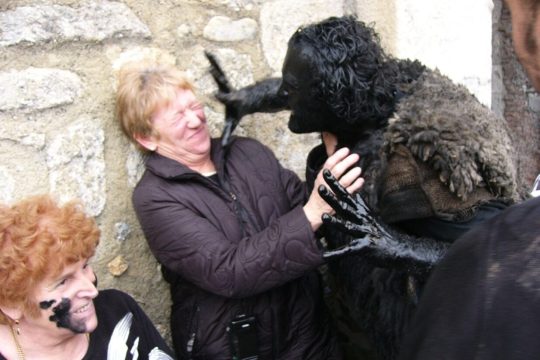
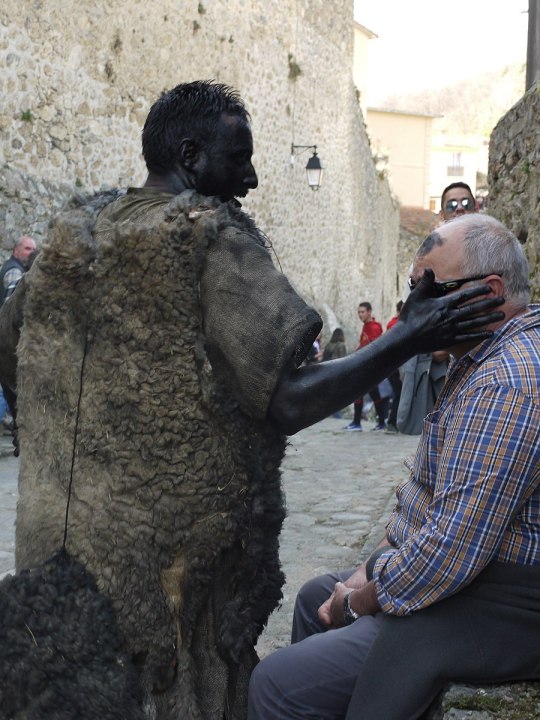
Festa de l'Os in Prats de Molló (Northern Catalonia). Vilaweb and Fabricio Cardenas.
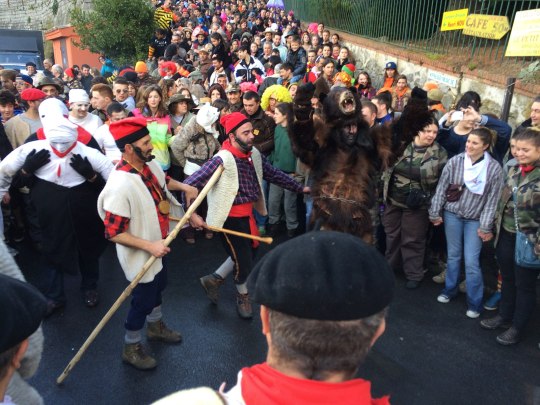
Festa de l'Os in Sant Llorenç de Cerdans (Northern Catalonia). Photographer: Marc Velasco.
The festivity ends when the hunters bring the bear to the town centre and take off his bear skin, turning him into a human. This represents the victory of humans over nature, but scholars also point that it could come from an ancient myth from the Pyrenees according to which humans evolved from bears (for reference, we don't have apes nor monkeys in this part of the world).
#candelera#la candelera#tradicions#candlemas#holidays#cultures#religion#religions#christian#history#festes de l'os#festa de l'os#bear#catalunya nord#sant llorenç de cerdans#prats de molló#ametlla de mar#l'ametlla de mar#feast of the presentation of jesus christ
45 notes
·
View notes
Text
hellenic holidays
Holidays are an important part of Hellenic religious life across all of the Mediterranean– whether Greek or Roman. For the sake of modernity, relevant Graeco-Roman holidays will be adapted to the contemporary Gregorian Calendar.
Ianouarios (Latin: Ianuarius, Eng: January)
Kalends (January), Roman era, Gregorian calendar, January 1: First day of the New Year, in honour of Janus. Large celebrations done, and charity is highly encouraged. Prayers to Lord Asklepios also recommended.
Phebrouarios (Latin: Februarius, Eng: February)
Kalends (February), Roman era, Gregorian calendar, February 1: First day of the month.
Parentalia, Roman era, Gregorian calendar, February 13 – February 21: Literally “Ancestors Days” or “Days of the Ancestors”, Parentalia is the February festival celebrating the deceased ancestors of the family and the pater familias. They are offered flowers, wine-soaked bread, violets salt, and wheat. Often they are providing a true sacrificial banquet, but these are di inferni, spirits of the underworld. They are those who dwell below, and proper care must be made in sacrificing to them.
Anthesteria, Greek era, Gregorian calendar, February 19 – February 21: Athenian festivals dedicated to Dionysos and the dead.
Lupercalia, Roman era, Gregorian calendar, February 15: Holiday intended to avert evil spirits and miasma, as well as spread purification; which releases health and fertility.
Lesser Eleusinian Mysteries, Greek era, Gregorian calendar, February 17-23 (Sign of capricorn): Serves as reminders of the Greater Mysteries, in honour of Deo and Kore.
Martios (Latin: Martius, Eng: March)
Kalends (March), Roman era, Gregorian calendar, March 1: First day of the month.
Navigium Isidis, Hellenistic-era Egyptian, Gregorian calendar, March 5-6: Festival in honour of Isis marks the opening of the sailing season.
Dionysia, Greek era, Gregorian calendar, March 9 – 16: Holiday dedicated to Bacchus.
Liberalia, Roman era, Gregorian Calendar, March 17: Another holiday dedicated to Bacchus.
Hilaria, Roman era, Gregorian calendar, March 15 – March 28: Numerous day celebration dedicated to the Mother of the Gods and Her lover Attis/Gallus.
Quinquatrus, Roman era, Gregorian Calendar, March 19: When the Temple of Athene on the Aventine Hill was consecrated. Feast day to Athene.
Aprillios (Latin: Aprilis, Eng: April)
Kalends (April), Roman era, Gregorian calendar, April 1: First day of the month. Dedicated to Aphrodite.
Genéteira tis Rómis (Natale de Roma), Roman era, Gregorian calendar, April 21: Day commemorating the founding of Rome by Quirinus, known as Romulus when embodied in a mortal form.
Serapia, Hellenistic-era Egyptian, Gregorian calendar, April 25: Day commemorating Serapis, the ruler of the underworld.
Maïos (Latin: Maius Eng: May)
Kalends (May), Roman era, Gregorian calendar, May 1: First day of the month.
Lemuria, Roman era, Gregorian calendar, May 9, 11 and 13: A trio of solemn days for the malevolent and restless dead, for maintaining their memory is as paramount as those of the benevolent ancestors. Sacrifices are offered as propitiation in order to keep the peace and avoid ill luck from these infernal spirits.
Thargelia, Greek era, Gregorian calendar, May 22 – May 23: Celebration in honour of Artemis and Apollo.
Iounios (Latin: Iunius, Eng: June)
Kalends (June), Roman era, Gregorian calendar, June 1: First day of the month.
Flight of Aineías, June 11: According to calculations by Eratosthenes, today is the day the city of Troy was sacked in 1184 BCE. The burning of Troy would be the end of the Trojan War, but simultaneously it would be the birth of a new beginning. Ultimately, Troy’s fall would give rise to the eternal city of Rome centuries later, as many of those who laid the city’s foundations had been descendant of the Trojan refugees led by the pious Prince Aineías who fled the destruction, such as Aineías’ descendant Romulus. Today is a day that feasts should be held to commemorate the flight of Aineías and the survival of our ancestors, but simultaneously a day of mourning for those innocent who perished, whether during the Trojan War or any war.
Prometheia, Greek era, Gregorian calendar, June 17th: Festival dedicated to Prometheus bestowing reason to mankind.
Vestalia, Roman era, Gregorian calendar, June 7th – 15th: Festival specifically in honor of the Goddess of the house, Vesta, and the spirits of the store chambers, cupboards, and the penates.
Death of Julian, Roman era, Gregorian calendar, June 28th: Mourning day marking the death of the divine Julian.
Ioulios (Latin: Iulius, Eng: July)
Kalends (July), Roman era, Gregorian calendar, July 1: First day of the month.
Panathenaia, Greek era, Gregorian calendar, July 17-24: https://sites.google.com/site/hellenionstemenos/Home/festivals/panathenaia-ta-mikra
Neptunalia, Roman era, Gregorian calendar, July 23: Held in honour of Poseidon. Plea for rain.
Augoustos (Latin: Augustus, Eng: August)
Kalends (August), Roman era, Gregorian calendar, August 1: First day of the month.
Sol Indiges, Roman era, Gregorian calendar, August 9: Minor holiday to King Helios where sacrifice is offered.
Vinalia Rustica, Gregorian calendar, August 19: A rustic harvest festival dedicated to Zeus and Aphrodite, celebrating the grape harvest, vegetable growth and fertility
Vulcanalia, Roman era, Gregorian calendar, August 23: A propitiatory sacrifice during the hot month of August to Hephaistos (Vulcan) in order to protect the home and livelihood from the ravages of fire. Traditional practices include sacrificing small fish into bonfires so that humans would not be harmed.
Septembrios (Latin: September, Eng: September)
Kalends (September), Roman era, Gregorian calendar, September 1: First day of the month. Ceremonies dedicated to Jupiter Tonans (“the Thunderer”) on the Capitolium, and Juno Regina on the Aventine.
Greater Eleusinian Mysteries, Greek era, Gregorian calendar, September 6-12 (Sign of cancer): In honour of Deo and Kore. Called great when the Goddess departs, (At least, the other equinox is in mythology the time of the kidnap of Kore, which is the descent of the souls.)
Apollo Campus Martius, Roman era, Gregorian calendar, September 23: Anniversary of the rededication of the Temple of Apollo in the Campus Martius; Leto is also honored
Oktôbrios (Latin: October, Eng: October)
Kalends (October), Roman era, Gregorian calendar, October 1: First day of the month. Dedicated to the deity Pistis (Fides in Latin).
Thesmophoria, Greek era, Gregorian calendar, October 2-4:
Khalkeia, ancient Hellenistic, Gregorian calendar, October 7:
Noembrios (Latin: November, Eng: November)
Kalends (November), Roman era, Gregorian calendar, November 1: First day of the month.
Feastday of Julian, Later Roman era, Gregorian calendar, November 8: Feast day dedicated to the coronation of Flavius Claudius Iulianus Augustus, the great reformer of Hellenism, as Caesar of the west.
Dekembrios (Latin: December, Eng: December)
Kalends (December), Roman era, Gregorian calendar, December 1: First day of the month. Dedicated to Poseidon and Pietas.
Saturnalia, Roman era, Gregorian calendar, December 17-23rd: Festivals that goes on for numerous days in celebration of the Winter Solstice with a particular focus on the golden age of Saturn.
Opalia, Roman era, Gregorian calendar, December 19: Festival in honour of Ops
Dies Natalis Solis Invicti, Later Roman era, Gregorian calendar, December 25th: Winter Solstice celebration dedicated to the birthday of God.
#source hellenicfaith#hellenic polytheism#hellenic#hellenic pagan#hellenic holidays#paganism#deity worship#roman deities#greek deities
17 notes
·
View notes
Text
That commemoration needed to be repeated, and regularly. Just as festivals such as the Parentalia were celebrated annually, historical memory too needed to be ‘‘fed.’’
Alain M. Gowing, Empire and Memory: The Representation of the Roman Republic in Imperial Culture
38 notes
·
View notes
Text

> Before we adopted the Latin name for our second month, Old English used much more vibrant names to describe the month now known as February. The most common Old English name was Solmonath, which literally means “mud month.” (https://www.dictionary.com/e/february/)
> A lesser-used term was Kale-monath, which meant “cabbage month.” Perhaps, the medieval English were eating a lot of cabbage in February? Strange. (https://www.dictionary.com/e/february/)
Once February became an official month its name was changed. It was derived from the Roman festival of purification called Februa. In funny fashion the festival also gave birth to the Roman deity Februus. What is also interesting to note is that January and February were added months. Originally the calendar year was only 10 months but in 700BCE they were added by the second king of Rome to make the year match up more with how long it takes the Earth to complete it's rotation around the sun.
𝔽𝕖𝕓𝕣𝕦𝕒𝕣𝕪 ℂ𝕠𝕣𝕣𝕖𝕤𝕡𝕠𝕟𝕕𝕖𝕟𝕔𝕖𝕤
⚘ Animals: otter, unicorn, dragon, groundhog, deer, sheep, hares, rabbits
⚘ Birds: eagle, chicadee, robin
⚘ Celebrations: Imbolc (Feb 2), Candlemas (Feb 2), Disablot (Feb 2), Februa (Feb 15), Valisblot (Feb 9), Lupercalia (Feb 15), Parentalia (Feb 13-21), Quirinalia (Feb 17), Equirria (Feb 27), Fornicalia (Feb 17)
⚘ Colors: light blue, violet, pale green, black, red, pink
⚘ Deities: Alhrodite, Juno, Mars, Brighid, Kuan Yin, Diana, Demeter, Persephone, Sjofn, Apollo, Boann, Chang-O, Parvati, Venus, Shakti, Bast, Selene, Hebe, Eros, Pan, Branwen
⚘ Element: air, water
⚘ Flowers: balm of Gilead, hyssop, myrrh, sage, spikenard, primrose, viola, snowdrop
⚘ Gender: neutral
⚘ Herbs: cypress, cinnamon, lavender, patchouli, lemon, orange, sandalwood, rose, jasmine, ginger, clove, frankincense, ylang ylang, palma rosa, bay, mint, nettles, rosemary, thyme, oregano, balm of Gilead, hyssop, myrrh, sage and basil.
⚘ Magick Areas: purification, growth, healing, energy, self-love, accepting responsibility, self-forgiveness, making future plans, astral realm, banishing, beginning, empowerment, fertility
⚘ Moons: Snow Moon (Dakota), Racoon Moon (Dakota), Eagle Moon (Cree), Bear Moon (Ojibwe), Black Bear Moon (Tlingit), Groundhog Moon (Algonquin), Goose Moon (Haida), Bony Moon (Cherokee), Hungry Moon (Cherokee)
⚘ Sabbat: Imbolc (Feb 1-2)
⚘ Scents: wisteria, heliotrope
⚘ Spirits: house faeries (home and house plants)
⚘ Stones: amethyst, ammolite, angelite, garnet, jasper, imperial topaz, onyx, aquamarine, fluorite, turquoise, ruby, bloodstone, moonstone, obsidian, pearl and quartz
⚘ Trees: rowan, myrtle, laurel, cedar, cypress
⚘ Zodiac: Aquarius, Pisces
#occult#occultist#occultism#occultblr#pagan#paganism#paganblr#witch#witchcraft#witchblr#witch community#witches#spirituality#correspondences#february#discord
9 notes
·
View notes
Text
“Forget the Dead at your Peril” A Parentalia Ghost Story
“Forget the Dead at your Peril” A Parentalia Ghost Story

View On WordPress
4 notes
·
View notes
Text
Ghosts in Ancient Rome
The belief in ghosts, or manes, permeated both daily life and religion in ancient Rome. These were seen by the Romans as the spirits of the dead, who lived on in some way or another after they passed away. Their view of the afterlife and the significance of appropriate funeral customs were closely related to the idea of manes. It was thought that the dead may come back to haunt the living if these rites were ignored or not carried out properly.
To respect and please the dead, the Romans observed a number of festivals and rites, including Lemuria and Parentalia. Families visited the graves of their ancestors during the Parentalia, which was held in February, to present food, wine, and other presents to the spirits. Families used this time to honor and remember their deceased loved ones, making sure they were happy and wouldn't bother the living. The Lemuria, which took place in May, was a more solemn event intended to placate lemures, or restless or evil spirits. The head of the family would carry out certain rituals during this festival, such as tossing black beans over his shoulder and chanting incantations to drive out any ghosts that might be hiding there.

Ancient Roman literature also displays their preoccupation with ghosts. Ghosts and haunted places are mentioned in the writings of writers like Virgil, Pliny the Younger, and Plautus. A character in Plautus's comedy Mostellaria makes the pretense that the house is haunted in an attempt to frighten off an unwanted guest. There are ghost encounters throughout Virgil's epic poem, the Aeneid. One such ghost is the spirit of Aeneas's father, Anchises, who provides instruction from the underworld. The letters of Pliny the Younger tell tales of spectral encounters, such as the well-known story of the haunted home in Athens where the residents were tormented by the restless spirit of an elderly man chained in chains.
The political arena was not exempt from the belief in ghosts. Numerous accounts of Julius Caesar's ghost appearing to different persons, including his heir Octavian (later Augustus), followed his killing in 44 BCE. The instability of the time and the divine favoritism or disfavor accorded to significant historical personalities were taken into consideration when interpreting these apparitions as omens.
Ghosts were frequently seen as representations of the immortality of the soul and the moral consequences of one's life choices in the larger framework of Roman philosophy and religion. Following the Epicurean school of philosophy, philosophers such as Lucretius argued against the existence of ghosts, considering them to be superstitious illusions. In spite of this criticism, the general public mainly upheld ancient beliefs and engaged in complex rituals to ensure that the spirits of the deceased were respected and appeased.

All things considered, the Romans' conception of death, the afterlife, and the moral duties of the living toward their ancestors relied heavily on ghosts, making them more than just fantastical creatures. These practices and beliefs, which emphasize the strong connection the Romans had with both the past and the afterlife, shaped their cultural and spiritual landscape.
2 notes
·
View notes
Text

'Vita enim mortuorum in memoria est posita vivorum'. 'The life of the dead is placed in the memory of the living' On this eighth day of Parentalia I venerate the divine manes of my father José Vicente. Born in Santiago de Compostela in 1947. His passionate love of Galicia, our language & culture marked his life. I shall endeavour to keep that enthusiasm alive in my own life.
"A vida dos mortos está posta na memória dos vivos"
Neste oitavo día de Parentalia venero o divino manes do meu pai José Vicente. Naceu en Santiago de Compostela en 1947, e o seu amor apaixonado por Galicia, a nosa lingua e cultura, marcaron a súa vida. Farei todo o que poida por manter vivo ese entusiasmo polo noso na miña propia vida.
0 notes
Photo

Happy Parentalia!
1 note
·
View note
Text
Excerpts:
Archaeologists in Narbonne, France, have unearthed a Roman necropolis containing nearly 1,500 burials—as well as glassware, pottery and other artifacts—that provide an intimate look into an ancient society’s funerary practices.
Narbonne was the Roman Empire’s first colony in Gaul, the region that includes present-day France. Located on the country’s southeastern coast, the city grew into a significant port on the Mediterranean Sea.
Near the end of the first century C.E.—nearly 2,000 years ago—Narbonne’s residents began a graveyard just outside town, according to a translated statement from France’s National Institute for Preventive Archaeological Research (INRAP), which ran the excavation. The ancient people of Narbonne used this cemetery for over 100 years, expanding it to nearly 54,000 square feet. [...] Along with practical items such as strigils—tools used to scrape dirt, sweat and oil from the skin—and lamps, the graves contained pendants, jewelry, animal teeth and coins. Researchers also found a number of phallic amulets, which were common ornaments in ancient Rome.
“Phallic emblems are found on a wide range of Roman objects, from amulets to frescoes to mosaics to lamps,” per New York’s Metropolitan Museum of Art. “They were symbols intended to bring good luck and ward off evil spirits. As the ancient author Pliny attests, even babies and soldiers wore such charms to invite divine protection.”
Ancient Romans didn’t just leave gifts with their deceased loved ones during visits to the cemetery. They also participated in an annual celebration of their ancestors known as Parentalia, which included a graveside feast. The Narbonne cemetery contains several platforms, known as “banquet beds,” built to host such events. Some of the graves even contained remains of food expressly left for the dead during Parentalia meals.
After the excavations ended in 2020, researchers spent four years analyzing the newly discovered artifacts. While many of these items are now set to be exhibited at Narbonne’s Narbo Via Museum, the human remains await further study.
/endquote Selected pictures with credit from article:

A ceramic goblet decorated with skeletons was among the grave goods. Denis Gliksman / INRAP

Numerous phallic amulets were found in the graves. Denis Gliksman / INRAP
#archaeology#classical studies#history#antiquity#archaeological discoveries#archaeological site#classical history#classical antiquity#classical era#classical period#classical age#ancient#ancient history#narbonne#france#necropolis#smithsonian#Roman necropolis#burials#burial#ancient society#funerary practices#funerary#roman empire#gaul#late 1st century C.E.#graveyard#National Institute for Preventive Archaeological Research#excavation#cemetery
2 notes
·
View notes